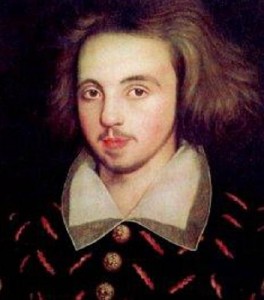 Writer, dramatist and poet, Christopher Marlowe was born in 1564 and was considered to be one of the premier writers of his day, greatly influencing his better known compatriot William Shakespeare. His life was short and ended violently but he is deemed one of the most influential figures in English literary history.
Writer, dramatist and poet, Christopher Marlowe was born in 1564 and was considered to be one of the premier writers of his day, greatly influencing his better known compatriot William Shakespeare. His life was short and ended violently but he is deemed one of the most influential figures in English literary history.
Christopher Marlowe was born in Canterbury. His father was a humble shoe maker and sent Marlowe to King’s School. He studied well and eventually earned a scholarship that saw him gaining a degree from Cambridge. About this time, rumors began to arise that Marlowe was working as an agent for Sir Francis Walshingham, Principal Secretary to Queen Elizabeth I.
It’s thought that Marlowe wrote his first play Dido, Queen of Carthage around 1587. This was quickly followed by Tamburlaine the Great, an epic tale in two parts that follows the rise of the hero from a simple shepherd to a powerful king. It was a big change from the turgid prose of previous poets and writers of the era, with a more vivid literary sense and plots of greater complexity.
Perhaps his two most famous works were The Jew of Malta that was first performed in 1592 and Doctor Faustus. Part of the success of Marlowe’s plays was the actor Edward Alleyn who was very popular at the time. Marlowe’s poetical works included Hero and Leander in 1598 and The Passionate Shepherd of His Love.

Not much is known about the true life of Christopher Marlowe and what there is, is often couched in mystery and myth. He has been described alternately as a spy, a rabble rouser, and a heretic. His involvement in spying is speculative and derives from his time at Cambridge where doubt over whether he would be awarded his degree was overridden by the Privy Council and the fact that he had several unexplained absences during his period there. Other records from the time show that he spent more lavishly than would be normal for someone of his standing on a scholarship.
There is no doubt that he traveled abroad on certain ‘missions’ and in 1592 he was arrested in the Netherlands on counterfeiting charges although he was never imprisoned. Whilst he was often linked to Catholicism on occasion, there was also rumor that he was an atheist, a dangerous belief in the late 15th Century.
As a writer he was widely admired by his contemporaries. Shakespeare famously paid tribute to him in his play As You Like It, quoting a line from Marlowe’s work Hero and Leander. Shakespeare was greatly influenced by Marlowe’s writing, reinvigorating his themes in many of his own plays. Michael Drayton, Ben Johnson and George Peele all wrote of Marlowe’s ‘mighty line’.

If his life was a conundrum, then the circumstances of his death are also shaded by the Marlowe mystique. Officially, he was stabbed to death by Ingram Frizer while staying at a house in Deptford. Frizer pleaded self-defense which was accepted by the coroner and Christopher Marlowe was then buried in an unmarked grave. Over the years there have been many theories about whether this was an argument that went wrong or something more sinister. There were rumors that Marlowe had got on the wrong side of the Earl of Essex and the meeting was to either gain the writer’s co-operation or silence him forever.
Marlowe was just 29 when he was killed and the exact whereabouts of his body remains a mystery.

